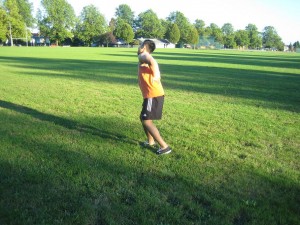A herniated disk refers to a problem with one of the rubbery cushions which is the disk found between the individual bones or the vertebrae that stack up to make up the spine. A spinal disk looks like a jelly donut with the center that is soft and encased within a tougher exterior. It is sometimes called a slipped disk or a ruptured disk. A herniated disk happens when some of the softer “jelly” will push out of the crack in the tougher exterior and cause irritation of the nerves and will result to pain, numbness or weakness in the arm or legs.
If you suspect that an individual has a herniated disk, it is best to consult a doctor for proper assessment and treatment. There are also steps to take to help ease the symptoms. By enrolling in one of the course on first aid, you will learn the appropriate steps to take to provide relief to the symptoms of a herniated disk.
Symptoms of herniated disk

- If the herniated disk is on the lower back, there is harsh pain in the thigh, buttocks and calf. It can also affect the lower region of the foot.
- If the herniated disk is on the neck, the pain can be severe and can be felt on the shoulder as well as arms. It will even spread into the arms or legs when coughing, sneezing or moving the spine into certain conditions.
- Experiencing numbness and tingling of the body parts that are served by the affected nerves.
- Muscles that are served by the affected nerves becomes weak
Causes of herniated disk
Herniated disk is caused by the gradual, aging-related wearing and tearing called disk degeneration. As the person ages, the spinal disk will lose some of their water content, thus their flexibility is reduced and they are more susceptible to tears or ruptures with just a minor strain or twist. By using the back muscles instead of the leg and thigh muscles in lifting large and heavy objects, it can cause a herniated disk and also turning and twisting while lifting something can cause a herniated disk.
Some complications due to a herniated disk need medical attention such as the worsening of the symptoms which includes pain, numbness or weakness in which the person cannot perform usual daily activities. Some people will experience cauda equine syndrome and becomes incontinent and will have difficulty in urinating even when the bladder is full.
Treatment and home remedies
- Take over-the-counter medications like ibuprofen or naproxen can help in reducing the pain caused by herniated disk.
- Apply cold compress initially to relieve pain and inflammation, then after a few days switch to a warm compress to give relief and comfort.
- The individual should avoid having too much rest since can lead to the stiffness of the joints and the muscles become weak which will cause complications, thus hindering the recovery process. A 30 minute rest and go for walk or doing some activity is advised, but avoid activities that can worsen the pain during the healing process.
